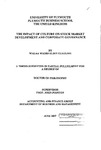Impact of culture on stock market development and corporate governance
| dc.contributor.supervisor | Pointon, John | |
| dc.contributor.author | Elkelish, Walaa Wahid Eldin | |
| dc.contributor.other | Plymouth Business School | en_US |
| dc.date.accessioned | 2011-05-11T11:36:23Z | |
| dc.date.available | 2011-05-11T11:36:23Z | |
| dc.date.issued | 2007 | |
| dc.identifier | Not available | en_US |
| dc.identifier.uri | http://hdl.handle.net/10026.1/383 | |
| dc.description.abstract |
This study takes a step forward to explore the dynamic relationship between cultural values and stock market development in the United Kingdom, during the period 1991- 2004. Cultural values are represented by the cultural model of Hofstede (1980) which consists of five dimensions, which are: power distance, uncertainty avoidance, individualism, masculinity and time horizon. Stock market developmenti s representedb y four indicators, which are: stock market activity, size, liquidity and concentration. Empirical results, using structural equation modelling (SEM), show that some cultural values have significant relationships with stock market development indicators. Power distance has a significant negative relationship with stock market size, while individuality has a significant positive relationship with stock market activity at the 0.90 confidence level. Furthermore, since good corporate governance systems are considered as an important component of stock market development, this study has been extended to explore the impact of cultural values on corporate governance systems across twenty four countries in Western Europe, North America and Asia Pacific. Corporate governance systems are represented by 6ght aspects, which are: board size, separation of chair and CEO, independence per board, independent audit committee, remuneration disclosure, women on board, code of ethics and ethics systems. The regression analysis results show that cultural values have a significant impact on several corporate governance systems across countries. Individuality has significant positive relationships with three corporate governance systems, which are: independence per board, audit committee, and ethics systems. Power distance has a significant positive relationship with separation of chair and CEO. The interaction term, uncertainty avoidance/masculinity, has significant negative relationships with three corporate governance systems, which are: independence per board, remuneration disclosure, and code of ethics. Moreover, the interaction term power distance/masculinity has a significant negative impact on women on board. This study concludes that several cultural values play an important role in the formation and behaviour of stock market development over time, and on corporate governance systems across countries. These results have important consequencesa t both firm and country levels and in terms of stock market integration across the globe. | en_US |
| dc.language.iso | en | en_US |
| dc.publisher | University of Plymouth | en_US |
| dc.title | Impact of culture on stock market development and corporate governance | en_US |
| dc.type | Thesis | en_US |
| dc.identifier.doi | http://dx.doi.org/10.24382/1296 | |
| dc.identifier.doi | http://dx.doi.org/10.24382/1296 |
Files in this item
This item appears in the following Collection(s)
-
01 Research Theses Main Collection
Research Theses Main


